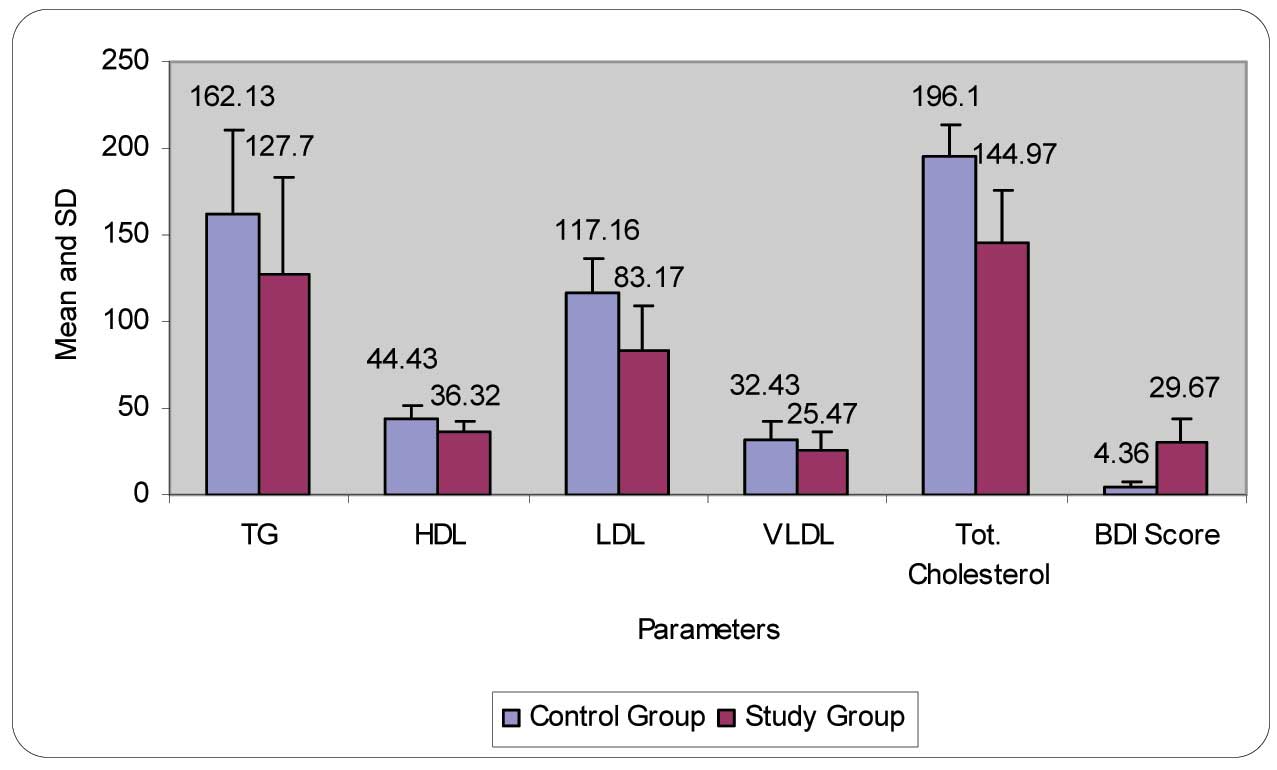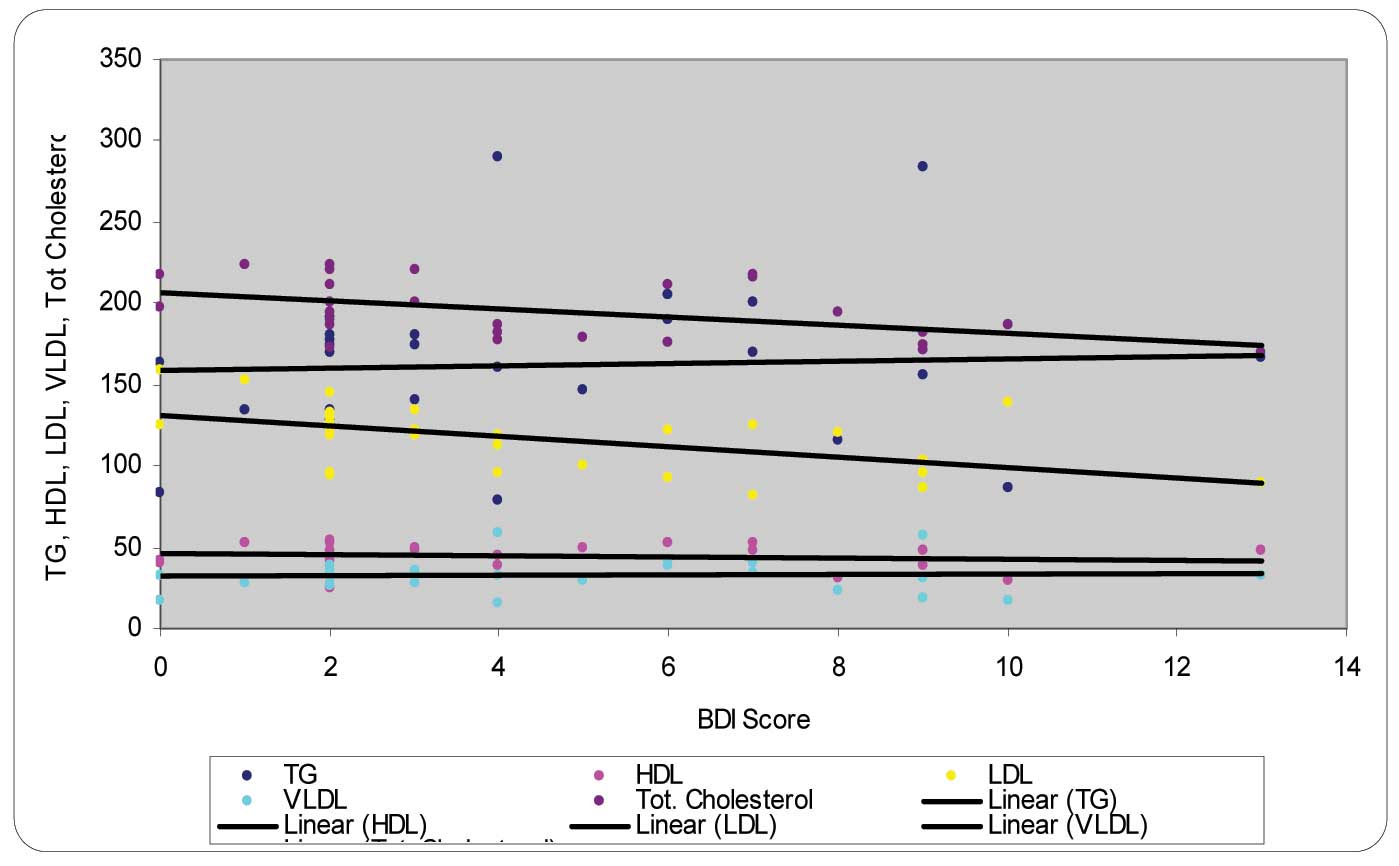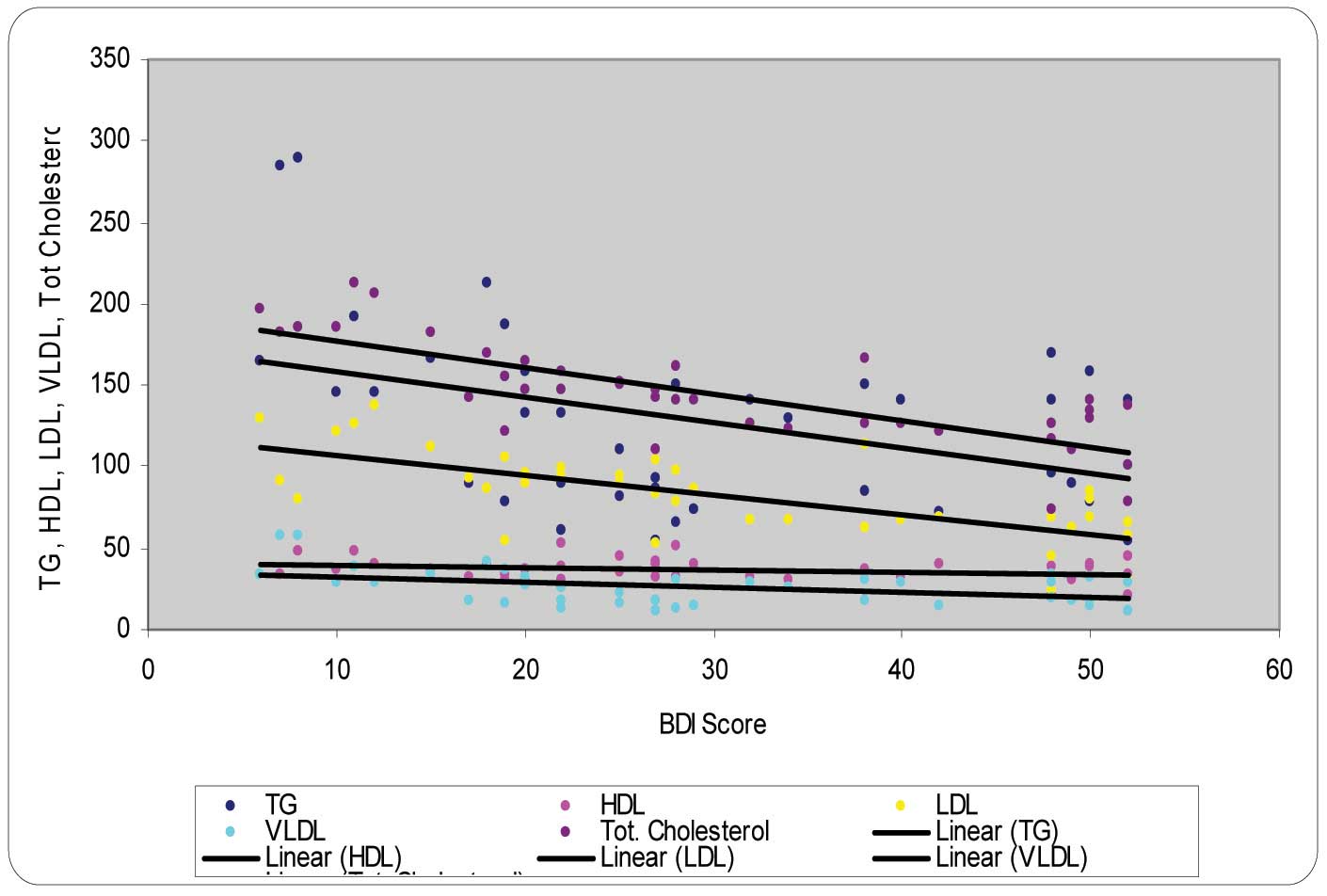People with low cholesterol levels are more likely to score high on measures of depression and anxiety than people with normal or high cholesterol levels. Adequate cholesterol is so essential that your body warns you with depression if serum cholesterol level is too low. The lower the cholesterol level, the deeper is the depression [1].
Depression is one of the contributory causes of morbidity in the general population, particularly with increasing stress. There are various aspects of the association between the TC levels and the health of the patient.
We undertook this study to assess the relationship between serum TC levels and depression. We also tend to assess the relationship of other lipid profile parameters like serum TG, HDL, LDL and VLDL with degree and severity of depression.
Materials and Methods
This study was conducted in the Clinical Biochemistry Laboratory, Department of Medicine and Department of Psychiatry at AVBRH, Sawangi (M) Wardha, India. The concerned psychiatrist randomly chose a group of 40 known patients of endogenous depression with mean age of 35.44±1.23, not associated with any other disease (study group). A group of 30 healthy individuals with mean age of 32.43±2.13 (control group) were selected from the local area by the physician. Written informed consent of all the individuals included in the study was taken at the time of health check-up, after describing the indications and utility of this study.
Exclusion criteria: Subjects with any other major illness; medication use for acute or chronic illnesses or for the treatment of hypercholesterolemia; smokers; subjects on treatment for depression, those on oral contraceptives and not falling in the age group of 30-70 years were excluded from the study.
Serum TC and other lipid parameters like TG, HDL, LDL and VLDL levels of both the groups were estimated to assess the relationship between lipid parameter and depression. Fasting blood samples were collected at the same time as health history. Estimation of serum cholesterol was done by CHOD-PAP Method [4] using fully automatic batch analyzer.
The intensity, severity and depth of depression was assessed in both the groups using the BDI [5] which is composed of 21 questions or items, each with four possible responses. In this inventory, each response is assigned a score ranging from zero to three, indicating the severity of the symptom. The sum of all BDI item scores indicates the severity of depression. For people who have been clinically diagnosed, scores from 0 to 9 represent minimal depressive symptoms, scores of 10 to 16 indicate mild depression, scores of 17 to 29 indicate moderate depression and scores of 30 to 63 indicate severe depression.
The statistical methods used were z-test and Pearson’s Correlation Coefficient. As the data is quantitative and the numbers of observations were more than 30, we used Z-test and for showing association between two quantitative data we used Pearson’s Correlation Coefficient.
Results
The mean age of the subjects of study group in years is 35.44±1.23 and in the control group, it is 32.43±2.13 [Table/Fig-1]. The number of males and females in the study group were 15 and 25 and in the control group were 14 and 16, respectively [Table/Fig-2].
Age wise distribution of subjects of both the groups Values in the brackets are in percentage.
| Age Group(yrs) | Control Group | Study Group |
|---|
| 31-40 | 18 (60) | 28 (70) |
| 41-50 | 4 (13.3) | 10 (25) |
| 51-60 | 5 (16.67) | 1 (2.5) |
| 61-70 | 3 (10) | 1 (2.5) |
| Total | 30 (100) | 40 (100) |
| Mean | 32.43 | 35.44 |
| SD | 2.13 | 1.23 |
| Range | 32-69 | 35-68 |
Gender wise distribution of subjects of both the groups Values in the Brackets are in Percentage
| Gender | Control Group | Study Group |
|---|
| Male (n=29) | 14 (46.67) | 15 (37.5) |
| Female (n=41) | 16 (53.33) | 25 (62.5) |
| Total (n=70) | 30 (100) | 40 (100) |
Lipid levels and BDI score in subjects of study and control groups:
[Table/Fig-3] shows the values of TC, TG, HDL, LDL, VLDL and BDI scores. The mean TG levels in the study and the control group were 127.70±55.25 mg/dl and 162.13±48.67 mg/dl (p=0.007), respectively. The mean HDL-C levels in the study and the control groups were 36.32±6.84 mg/dl and 44.43±7.69 mg/dl (p=0.000), respectively. The mean LDL-C levels in the study and control group were 83.17±25.45 mg/dl and 117.16±19.77 mg/dl (p=0.000), respectively. The mean VLDL-C in the study and control groups were 25.47±11.08 mg/dl and 32.43±9.76 mg/dl (p=0.007) respectively. The mean TC levels in the study and control groups were 144.97±30.98 mg/dl and 196.10±17.61 mg/dl (p=0.000), respectively. The difference in the mean values of lipid levels between control and study group is statistically significant. The BDI score in the study and control groups were 29.67±14.59 and 4.36±3.29 (p=0.000), respectively and it is statistically significant.
Comparison of TG, HDL, LDL, VLDL, TC and BDI score in control and study groups

[Table/Fig-3] shows that serum levels of TC, TG, HDL, LDL and VLDL were low in study group as compared to the controls, while the BDI score showed higher value in study group as compared to control group.
TC, HDL and LDL were significantly low in study group as compared to control group, while BDI score was significantly high in study group as compared to control group.
Discussion
TC has been identified as a risk factor for older adult mortality but is commonly attributed to the fact that low TC levels indicate malnutrition, chronic infections, and subclinical or hidden diseases [6–8].
Our study found that the TC levels were significantly low in patients suffering from depression as compared to healthy individuals. This may be due to changes in the cholesterol content of the synaptosomal membrane and a decrease in the number of serotonin receptors due to a decrease in cholesterol concentration [9]. Since membrane cholesterol freely exchanges with the cholesterol in the surrounding medium, a lowered cholesterol concentration may contribute to a decrease in brain serotonin, with poorer suppression of aggressive behavior [7,10]. All other parameters besides TC showed lower values in patients of depression [Table/Fig-3]. The BDI scores are higher in subjects of study group. Low lipid levels can be the cause of decreased activity of serotonin receptors and serotonin transporter by decreasing the lipid micro viscosity of the membrane of the neural cell [11,12]. Cholesterol is essential as 10-20% of the brain is composed of cholesterol. Essential substances like the sex hormones, vitamin-D and bile acids are also constructed of cholesterol. Therefore it is absolutely not true that a low cholesterol level is healthier [13].
According to a recent study, men who have relatively low levels of cholesterol (< 160 mg/dl) are four to seven times more likely to report symptoms of severe depression than men with high cholesterol levels [14].
Person with low cholesterol can benefit by raising their level through healthy dietary measures, like consuming more fish, fish oil or linseed oil. Eating fatty fish or linseed oil can help to lift depression. Fatty fish such as salmon, cod, and linseed oil contain omega-3 fatty acids which are required to raise the levels of serotonin in a way similar to anti-depressants [12].
Depression is one of the contributory causes of morbidity in the general population, particularly with increasing stress.
These values and [Table/Fig-4 and 5] showed that the negative co-relation is stronger in study group, as compared to control group. This indicates that as the TC and LDL value decreases the severity of depression increases. In study group, other lipid parameters like TG and VLDL also showed significant negative co-relation with BDI scores (r = -0.41 and r = -0.418), respectively. HDL does not show any significant co-relation with BDI score in study group (r = -0.26). Very few of researchers have been able to assess the co-relation between low lipid levels and depression. More work is required in this field. Once the relation between low levels and depression is assessed, it will not only be easy to diagnose the condition but also will help in screening the healthy people for depression by estimating their serum cholesterol levels and further we can prevent this by taking timely measures.
Correlation of BDI score with TG, HDL, LDL, VLDL, TC in control group TC (r = -0.478) and LDL (r = -0.52)

Correlation of BDI score with TG, HDL, LDL, VLDL, TC in study group TC (r = -0.78), LDL (r = -0.69), TG (r = -0.41), VLDL (r = - 0.418), HDL (r = -0.26)

Conclusion
It was found that there is a strong negative correlation between lipid levels, particularly TC and LDL with depression. Lipid levels below a certain limit are not good as it may cause depression. Patients with low lipid levels should be screened for depression so that if necessary, corrective measures can be taken at the earliest. More over serum TC can also be used as a screening test along with depression inventory.